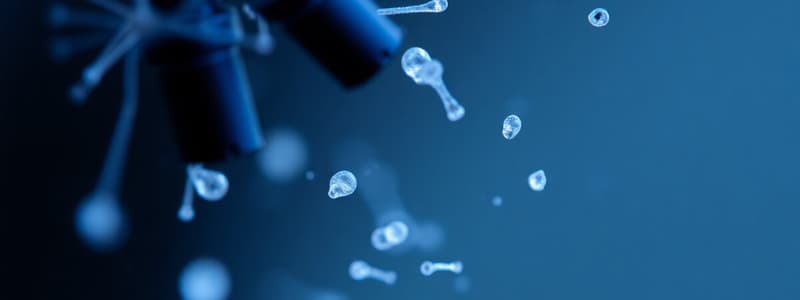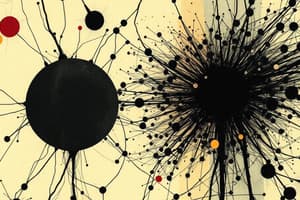Podcast
Questions and Answers
Which of the following describes the concept of resolution in a microscope?
Which of the following describes the concept of resolution in a microscope?
- The distance between the lens and the specimen.
- The ability to enlarge an image of a specimen.
- The maximum size at which an image can be viewed.
- The ability to see fine details and distinguish between two separate points. (correct)
What is a significant limitation of electron microscopes?
What is a significant limitation of electron microscopes?
- They cannot visualize extremely small details within a cell.
- They require extensive training to operate. (correct)
- They do not provide high magnification images.
- They can view complete cells without limitations.
When using a microscope, what is the role of the coarse focus knob?
When using a microscope, what is the role of the coarse focus knob?
- To adjust the light intensity.
- To adjust the position of the eyepiece.
- To quickly bring the specimen into general focus. (correct)
- To change the magnification power of the lens.
Which type of microscope is best suited for viewing small details within a cell at a very high magnification?
Which type of microscope is best suited for viewing small details within a cell at a very high magnification?
What is the first step when preparing to use a microscope?
What is the first step when preparing to use a microscope?
Flashcards
Magnification
Magnification
The ability to make an image appear larger.
Resolution
Resolution
The ability to distinguish between two closely spaced objects.
Light Microscope
Light Microscope
A type of microscope that uses light to illuminate the specimen.
Electron Microscope
Electron Microscope
Signup and view all the flashcards
CARE of microscope
CARE of microscope
Signup and view all the flashcards
Study Notes
Microscopy
- Microscopes are devices with magnifying lenses to view details and enlarged images of small objects.
- Two main functions:
- Magnification: enlarging an image, like zooming in on a specimen.
- Resolution: clarity or the ability to distinguish fine detail, to see two points as separate.
- Magnification and resolution are related; increasing magnification usually improves resolution.
- Types of microscopes:
- Light Microscopes
- Electron Microscopes
- Dissecting Microscopes
Electron Microscopes
- State-of-the-art microscopes.
- Able to achieve extremely high magnifications (up to 1,000,000x).
- Useful for viewing minute details within cells (though it can not show an entire cell).
Parts of a Light Microscope
- Eyepiece (Ocular Lens): The lens you look through.
- Body Tube: Connects the eyepiece to the objective lenses.
- Revolving Nosepiece: Holds the objective lenses.
- Objective Lenses: Magnify the image (short, medium, and long focal lengths).
- Stage Clips: Holds the slide in place.
- Stage: Platform where the slide rests.
- Diaphragm: Adjusts the amount of light passing through the specimen.
- Light Source: Provides illumination.
- Condenser: Concentrates light on the specimen.
- Coarse Adjustment Knob: Used for initial focusing.
- Fine Adjustment Knob: For precise focusing.
- Arm: Supports the body tube and lenses.
- Base: The bottom support of the microscope.
How to Use a Microscope
- Place the slide on the stage and secure it with stage clips.
- Rotate the nosepiece to select the lowest power objective lens.
- Look through the eyepiece.
- Use the coarse adjustment knob to bring the specimen into approximate focus.
- Use the fine adjustment knob for precise focus.
Studying That Suits You
Use AI to generate personalized quizzes and flashcards to suit your learning preferences.




